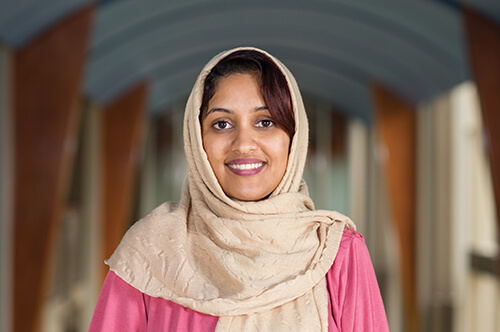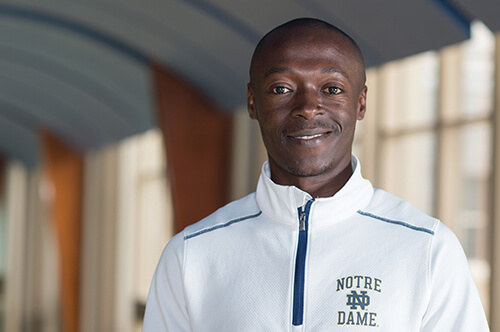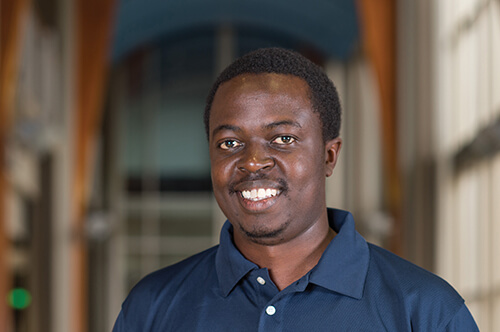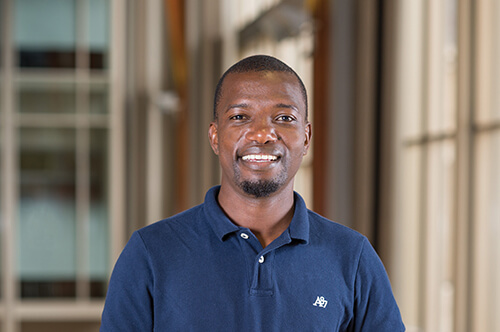Constantine Nyanzero, an entrepreneur from Zimbabwe, defines Africa’s challenges in a single word: “Access.”
For want of a key to open any number of different doors — to sufficient food and clean water, to quality education and reliable health care — many people across the continent remain closed off from progress. Every social problem, Nyanzero believes, stems from that overriding lack of access. Every solution, then, begins with a single question: “How do we create access?”
Nyanzero was among the young leaders from Africa who spent six weeks this summer at Notre Dame, one of the U.S. host universities for the Mandela Washington Fellowship, part of President Obama’s Young African Leaders Initiative. The 25 Notre Dame fellows, representing 20 countries and a range of professional interests, took business and entrepreneurship courses in the University’s Mendoza College of Business.
The program included visits with government and business leaders; trips to Chicago, Indianapolis and Detroit; and excursions to minor-league baseball games and rafting on the East Race. It culminated with an early August visit to Washington, D.C., where all 1,000 fellows from American host schools attended a town hall with Obama.
They came here not only to expand their own access — to people and ideas and experiences — but also to learn how to open more doors for others back home. Their work already had demonstrated how that priority drives them.
Nyanzero has established a regular free networking event intended to give entrepreneurs access to potential investors and clients that the participants otherwise could not afford to reach.
Khadijetou Abed, a software developer from Mauritania, created a mobile app to increase access to medical treatment and, especially, to information about preventing and managing diabetes or other chronic diseases for a population that often doesn’t know what might hurt them.
Goddy Epie Ngene, a research assistant for Cameroon’s Ministry of Forestry and Wildlife, has two distinct but related ambitions: to give his country’s six million small-scale farmers access to information to expand their yield and to prevent deforestation in the Congo basin.
Alex Kawooya, a Ugandan tech entrepreneur who started in mobile-phone messaging, profits from everyone having as much access to everyone else as possible. His businesses — plural; he’s 30 years old and started his first company in college — have tapped into the technological explosion in his country, extending the reach and vision of individuals and companies.
Those four represent just a sampling of more than two dozen similar stories among the Mandela Washington fellows on campus this summer, the program’s third year. Although they have overcome challenges of their own, participants have benefited from access that others in their home countries lack. They radiated motivation and optimism about expanding opportunity and prosperity around them when they return.
Charles Immanuel Akhimien of Nigeria, speaking at the group’s concluding dinner, referred to a quote attributed to Nelson Mandela: “It always seems impossible until it is done.” His Mandela Washington Fellowship colleagues, Akhimien said, “have all defied impossibility at various stages in their lives,” demonstrating that “impossibility is nothing and everything is possible.”
Tell Khadijetou Abed she can’t. People always have. She consumes the doubt and burns it like calories in pursuit of the supposedly impossible.
“When someone tells me I cannot do,” Abed says, “I will do.”

As a woman in the Islamic republic of Mauritania, she faced social resistance to traveling abroad for an education, but with her family’s support she earned an engineering degree in Morocco and a business informatics master’s in France.
Her choice of subjects also was considered inappropriate and beyond her ability. Abed had no background in mathematics, but being told she’d never have the aptitude only inspired her to register. The skeptics included school officials, who resisted enrolling her in the program.
Her father insisted that Abed receive a place, that she be evaluated on her capacity to do the work and not presumed incapable as a female. She passed.
Abed’s reservoir of will must come from deep within, so deep that it’s almost invisible on the surface. She commands attention not from the strength of her personality but from a demure nature that requires close listening. Her voice is soft, easily muffled when laughter erupts from a table across the bookstore café.
Shy about her English, which she has studied for only two years, she speaks with a proficiency indistinguishable from fluency. In her quiet way, accented with the inflections of her native French, Abed has much to say.
She tells a story about accompanying her mother, who has diabetes, on a visit to the doctor several years ago. There they encountered another diabetes patient who had lost the lower half of a leg to the condition. The distraught woman told Abed that she had no idea the complications could be so severe. She had seen a doctor, but he had never explained the extent of the threat diabetes could pose.
For Abed, the moment revealed a problem at the heart of heath care in Mauritania. Even if people are able to see a doctor — itself a challenge for many residents, especially in rural parts of the country — they might be one of 50 or 60 patients a day rushed through with only a fleeting consultation. In those circumstances, information about how to prevent or manage chronic diseases is scarce.
Abed’s solution: a mobile app to connect diabetes patients to distant doctors, allowing people to upload symptoms or questions and receive advice that otherwise would be unavailable. Visiting a doctor might be time- or cost-prohibitive, but “in my country we have 200 percent of people that use smartphone,” she says with a chuckle.
Her DiabApp that connects patients and doctors won first prize two years ago in a national competition. In the marketplace, on the other hand, doctors did not line up to give free, virtual advice, so Abed partnered with insurance companies to offer them compensation for the service.
The app’s impact so far is small and the company employs only four people, all trained in technology, not business. But Abed exudes determination to see it succeed.
She admits the idea for the app to fill the need she identified in her country overpowered any doubts she might have had because of her lack of business training. Without information such as market research, which most entrepreneurs would consider essential, she sped ahead.
Abed applied to be a Mandela Washington fellow for the education in entrepreneurship that she lacked. As her business grows or new ideas arise, she might take a different approach to bringing her products to market, but her mission will remain the same.
“To be a leader,” Abed says, “you must have a project that can help communities.”
For Cameroon’s six million small farmers, the average annual corn yield is about two tons per hectare. In the United States, it’s seven times that amount.
Goddy Epie Ngene, the son of Cameroonian corn farmers, has developed technology that could increase his country’s agricultural production. The challenge is communicating that information to the people who could put it to use.

Ngene created an app to identify what crops would be best suited to the soil and other environmental conditions on a particular farm and best practices for the highest output. The app can track the weather to determine, for example, when to apply pesticide to avoid it being washed away in the rain. All he needs is a farm’s global-positioning data and a farmer with a mobile phone.
That sounds like a commonplace transaction in this day and age, a simple and productive use of technology. And it would be if the farmers in Cameroon were not typically illiterate or if they spoke a common language instead of nearly 300 tribal dialects.
“We can deliver the knowledge,” Ngene says, “but they cannot read it.”
One solution is to use photographs to overcome the illiteracy barrier, a small first step to help millions of people divided by so many dialects and rooted in traditional practices learn new ways to farm their fields.
Ngene’s goals are modest. Relatively simple advances, he says, could produce small increases in crop yields. Spread across a country where small farmers make up about 60 percent of the workforce, he says, the effect would be profound.
He saw the potential on his family’s farm. When Ngene, now 33, got his first job, he could afford to buy his parents a higher quality of seed. Their yield tripled. And it happened without any other information that Ngene’s app could now deliver, like how to best irrigate crops and fight pests under their farm’s specific conditions.
The additional production pleased his parents, Ngene says, “but I was very sad because I understood that they just lacked the knowledge.”
His motivation to help spread that knowledge included more than the potential nutritional and economic impact of increased production on a country in need. Ngene also wants to save the Congo basin rainforest.
He monitors deforestation for Cameroon’s Ministry of Forestry and Wildlife. Higher crop yields on existing arable land would limit the expansion of farms to meet needs, a common practice that encroaches on the forest.
Ngene’s forestry job also involves evaluation: How well are government policies working to prevent deforestation? His work with farmers, on the other hand, is a direct intervention that stirs his results-oriented consciousness.
“If I can impact the small-scale farmers,” Ngene says, “at that level deforestation will be reduced, and for me that will be a positive result.”
When it comes to new technology, Alex Kawooya says, Ugandans leap. Starting an IT company while still in college showed that he had an entrepreneurial spring in his step.
That was in 2007. A major African mobile phone company had transformed communications in Uganda, making cellphones, once prohibitively expensive, accessible to almost everyone. Soon the devices were ubiquitous.

“Suddenly your mother has a mobile phone, the guy in the village has a mobile phone,” Kawooya says. “So you realize this is really, really growing fast.”
Texting via short message service (SMS) was far cheaper than making calls, so it became the preferred form of communication between individual users and for companies seeking to advertise to that growing market. A company like Kawooya’s could negotiate the best deals for access to the messaging network, attracting customers interested in large group messaging.
People planning events like weddings, for example, could contract with Kawooya’s Visions Unlimited to send information to guests.
“It was cheaper for you to go through us because we had an arrangement with the network so SMSs were cheaper,” Kawooya says. “And also the convenience of it.”
As services such as WhatsApp supplanted SMS, Kawooya’s 15-person company adjusted to changes in mobile technology, but Visions Unlimited settled into a steady rhythm, boring really, running on autopilot. He wanted to try something new.
Because customers viewed the company as operating under the broad umbrella of information technology, they would make requests for repairs and other services. He took on the projects almost with a shrug, but they turned out to be the path to expansion.
Soon the company evolved into selling hardware, software and providing support, a more difficult business that requires competitive bidding and relationship-building in a crowded — and often corrupt — marketplace. Kawooya spun that part of the business into a company called Rackmount and says its advantage comes in quality and service.
Knockoff products are common and cheap from fly-by-night companies, but Rackmount has carved out its niche by assuring equipment durability and responsiveness if anything goes wrong. Unlike Vision Unlimited’s messaging business, the new company’s growth happened more slowly, requiring careful relationship management to enhance its reputation.
“We have kind of gained credibility among the organizations that we have worked with,” Kawooya says. “Before I left [for the fellowship] we got a contract with GE. General Electric is opening its first office in Uganda, so they signed us on as one of their IT partners.”
That makes it a tricky time for the CEO to be away for six weeks, but the expansion of his knowledge and professional network makes it worthwhile. He has contacts at IBM, Hewlett-Packard and Facebook now, to name just a few of the companies whose representatives met with the fellows. And he has received an education, particularly in financial management, that will make his company more agile in responding to Uganda’s next technological leap.
“I keep telling the guys back at the office what I’m getting from this is 10 times more valuable than me sitting in the office,” Kawooya says. “I would do it for a year if I could.”
When Constantine Nyanzero needed money for college expenses, he went along with his mother to sell brooms. With more time than she had to devote to selling, he figured he could surpass what he needed to cover his costs at Midlands State University in Gweru, Zimbabwe. Soon he was selling 20 to 30 brooms a day, earning many times more than he needed.
That extra money allowed him to buy a desktop computer and a printer, tools that became central to his education in more ways than one. Nyanzero says he’s always been a “tech head,” so a personal computer was as liberating and illuminating as a textbook. And because so few others on campus had computers of their own, he became a sought-after typist for assignments that could not be turned in handwritten. Fellow students, of course, paid for the service.

As he recalls those days now, more than a decade later, Nyanzero, 30, speaks of them as shaping his perception that lack of access represents the biggest obstacle to ordinary Africans. It took some time, though, before he translated that insight into professional practice.
Selling computer hardware and software out of college left him cold. He wanted to make things, not just sell products, so he quit after two years to start his own company. Operated out of an internet café, that entrepreneurial venture “failed miserably.” Like other start-ups clustered in the same café, the lack of access to potential investors and clients doomed his business ideas.
In November 2013, Nyanzero and a friend decided to create an event that would put people who needed to know each other in the same room. Their expectations were low.
An acquaintance offered a church basement free of charge to hold the meeting, and 20 people responded to an Evite. On November 18, the organizers set up 20 chairs, filled a coffee urn for the expected group and opened the doors.
“Six o’clock came and 100 people showed up,” Nyanzero says. “By 6:30 we had 125 people.”
They were mostly aspiring entrepreneurs with products to pitch, but they brought complementary skills and comparable problems. An app developer might need a designer but couldn’t afford to hire one. A designer might need work to fill a portfolio and offer services pro bono in the hopes of impressing paying clients.
“You need an ecosystem around your business,” Nyanzero says, and the church basement evolved into an entrepreneurial Galapagos in southeastern Africa.
The organization, called Emerging Ideas, has grown beyond the basement, now holding monthly meetings that as many as 300 people, including venture capitalists looking for investments, attend. It’s free of charge with pizza provided, Nyanzero says, because the people pitching their ideas often have so little money that they’d otherwise be forced to choose between dinner or transportation to the meeting.
To help budding companies that lack a space of their own, he approached the owner of a largely vacant Harare office building about providing room for startups. Offices and meeting rooms offer a professional environment for entrepreneurs to pitch investors and for established collaborations to flourish.
Nyanzero also has contributed to the growth of a nationwide project called Innovation Baraza — baraza is marketplace in Swahili. Founded by former World Bank official Mungai Lenneiye, Innovation Baraza offers mentorship, a fair for entrepreneurs to pitch ideas and, for the select best, even a Shark Tank-like presentation before judges called Simba Savannah.
He takes great satisfaction from providing access to the marketplace for entrepreneurs. He’s not exactly making things, as he envisioned when he left his sales job, except an impact, which has only deepened his commitment to making more. As Nyanzero puts it, “We want to be able to mass-produce success.”
Jason Kelly is an associate editor of this magazine.